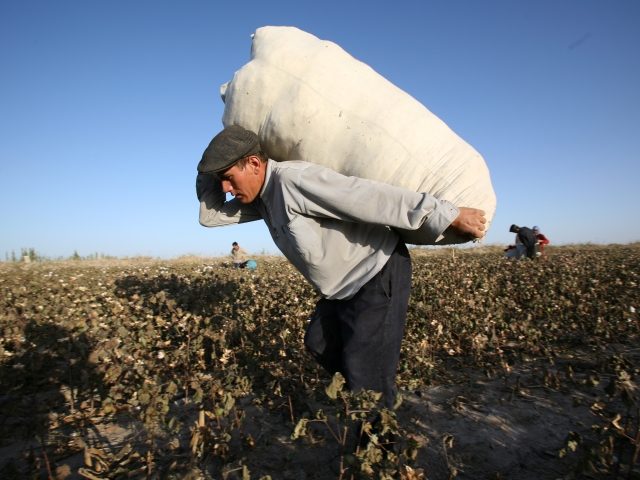China’s Global Times government-run newspaper published an outraged editorial on Tuesday condemning America as a “menace” for implementing the Uyghur Forced Labor Prevention Act, which requires companies to prove any product imported from occupied East Turkistan is not made by slaves.
Extensive evidence – including government advertisements selling slaves online – has illustrated a growing trade of Uyghur, Kazakh, and other Muslim-majority ethnic group enslavement in East Turkistan, which China refers to by the Mandarin name “Xinjiang.” Xinjiang is the largest region of China and has, since at least 2017, endured a Communist Party genocidal campaign against those same groups, fueled by mass forced sterilizations of women and the imprisonment of as many as 3 million people in concentration camps.
The vast majority, over 80 percent, of China’s cotton comes from East Turkistan, representing about 20 percent of the global market. East Turkistan is also a hub for manufacturing solar panel components and other “green” energy goods.
The Uyghur Forced Labor Prevention Act was passed in December but went into effect on June 21. From that date on, any company attempting to import any good into the United States from East Turkistan must overcome a “rebuttable presumption” that the goods were made by slaves with documentation showing the full supply chain that led to the product being manufactured and arriving in America.
The Global Times editorial board called the request for corporations to take responsibility for any potential slavery they may profit from a “serious escalation in the U.S.’s campaign to contain China” and a “menace [to] global supply chains.” The Communist Party, it concluded, must take “serious countermeasures” to punish the American government and prevent the idea from spreading to other free states, jeopardizing China’s stranglehold on the developed world’s supply chains.
The Times insisted that the party should punish individual businesses who follow the American law or stop doing business with East Turkistan or China more generally.
“In light of the fresh escalation by the US, China needs to prepare and take all necessary measures to strike back at the US and safeguard its national interests,” the government newspaper proclaimed. “There are many ways China can make its opposition to the vicious bill clear to the US, including reciprocating measures against the US.”
“Also, businesses that follow the US’ order and harm Chinese interests could face serious consequences in the Chinese market,” it continued, “as some foreign brands have experienced before as they faced serious backlash from Chinese consumers for banning Xinjiang products.”
The newspaper went on to call the widely documented evidence of institutionalized government slavery in East Turkistan “utter lies” and predicted that America would be “increasingly despised, abandoned and isolated in the global economy because it is becoming a major threat to global supply chains.”
The Chinese Foreign Ministry responded to the implementation of the anti-slavery law on Tuesday with similar ire, calling the Uyghur Forced Labor Prevention Act a law “built on a lie” and accusing America of “suppression on [sic] China,” according to the government’s English-language transcript of Tuesday’s regular press briefing.
“The act is a clear indication that the U.S. is seeking to engender forced unemployment in Xinjiang through legal form of actions, and to make the world decouple with China,” spokesman Wang Wenbin said. “It fully exposes the US’s hegemonic nature – a country that violates human rights and breaks rules in the name of preserving them.”
Wang did not elaborate on how banning slave-made goods from entering the country was a human rights violation.
China’s Commerce Ministry similarly condemned America for hitting its bottom line, calling restrictions on Beijing’s slave profits “bullying.”
“What the US is doing is a typical act of economic coercion. It seriously harms the vital interests of businesses and consumers in China and the US,” a Commerce Ministry spokesperson proclaimed, according to the Global Times, “and it is neither conducive to the stability of global supply chains nor to the recovery of the world economy.”
“The destructive bill will come back to bite the US itself ultimately,” the Times, citing government-approved “experts,” later concluded. “The US economy is now mired in many problems, including skyrocketing inflation, a stock market bubble, emerging signs of recession and mounting debt. The act will further tighten supply in US markets and push up inflation.”
China — and American businesses that profit from trade with China — aggressively rejected the law when it was first passed in December. At the time, the Global Times called it a “blasphemy against real democracy, human rights, and free trade.”
Sen. Marco Rubio (R-FL), who spearheaded the legislation, noted at the time that it did not make any radical changes to the way the import system was supposed to work in theory.
“It’s already illegal, by the way, to bring goods made with slave labor; it’s been that way since the 1930s,” Rubio observed in remarks to the Senate in December. “And yet it’s still happening, and we know it’s happening at an alarming, horrific rate with the genocide that we now witness being carried out by the Chinese government in the Xinjiang region.”
While limiting imports from East Turkistan will likely prevent some slave-made goods from entering the country, research suggests that limiting imports only from that region will do little to prevent those goods from entering the country. In a 2020 report titled Uyghurs for Sale, the Australian Strategic Policy Institute (ASPI) revealed that Chinese government-linked companies were openly selling Uyghur slaves to factories far from East Turkistan, busing concentration camp victims to other provinces to work in factories not affected by the Uyghur Forced Labor Prevention Act.
A year later, Sky News found dozens of advertisements on Baidu, a Chinese search engine that hosts job postings, selling Uyghur slaves “in batches of 50 to 100 workers” to companies outside of the Uyghur heartland.

COMMENTS
Please let us know if you're having issues with commenting.